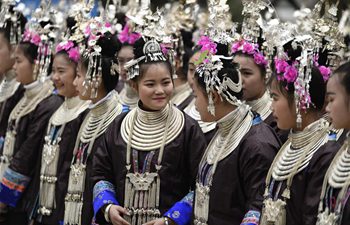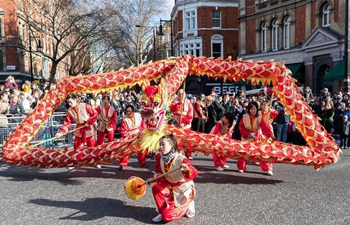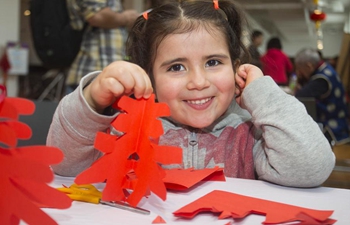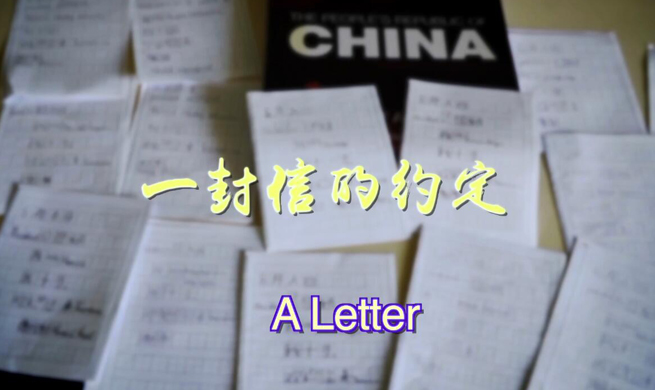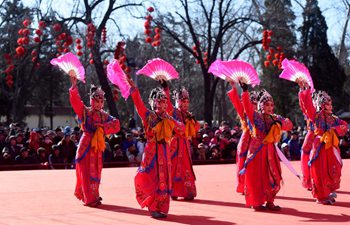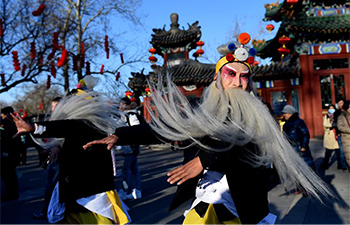BEIJING, Feb. 20 (Xinhua) -- Whenever Du Bing thinks of the New Year celebrations of her childhood, she remembers the gaudy artificial flowers at her home. The pink peonies, a much favored flower in China, seemed to represent the dull, bleak tones of winter. But now, instead of fake ones, she prepares fresh flowers.
"Purchasing fresh flowers has become a daily routine for me," said the 33-year old. "They cheer me up."
Du, from Huizhou City in southern China's Guangdong Province, buys her flowers from "Reflower," an e-commerce company. By purchasing a 99-yuan (16 U.S. dollars) package, Du has a bunch of flowers sent to her door every Saturday or Monday for a month.
Each delivery contains six to 10 flowers. Customers can also buy packages for 139, 169 or even 388 yuan.
Founded less than three years ago, Reflower has more than 7 million followers across 300 Chinese cities.
However, when they started the business in July 2015, fresh flower purchases in China were mainly limited to festivals and special occasions, often by businesses. In the Netherlands, more than half of fresh flowers are bought by individuals, and in the United States it is 40 percent, according to Jia Lan, co-founder of Reflower.
"In 2015, annual sales of fresh flowers in China were 41 billion yuan, equal to 5 U.S. dollars per capita. The per-capita consumption was ten-fold that higher in Europe and the United States and seven times in Japan," Jia said. "So we believe there's a big market potential in China."
"The number of our followers exploded in the first quarter of 2016. Our sales volume rocketed by six times last year," Jia said.
The revolution in supply has also reshuffled the flower farming industry. "When flowers were luxuries, farmers only served big holidays such as the Valentine's Day and Christmas. Seldom did they care about efficiency. That's also why prices of fresh flowers in China are stubbornly high," Jia said. "The wastage of fresh flowers during delivery was as high as 30 percent, but we can make it less than 1 percent now, so even selling at such low prices, we can still make some profit."
Yunnan Province, China's largest flower farming region, planted about 87,000 hectares of flowers in 2016.
At the Dounan flower market in Kunming, Yunnan's capital, more than 1,000 tonnes of fresh flowers are sent to 80 Chinese cities and 50 countries and regions every day. Last year, Dounan sold over 6.5 billion flowers. Its sales revenue was 5.3 billion yuan.
"It's obvious that more people are coming to buy flowers for themselves," said Kang Ning, a retailer, who has been here for three years.
"I came eight times this year and spent about 1,000 yuan on flowers," said a customer surnamed Wang.
The young post 80s and 90s generation are the main consumers of fresh flowers, according to Xu Jia of FlowerPlus, another online flower delivery company.
"Our main customers are white-collar females, and more than 62 percent have an education background of bachelor degree or above. They are a group of consumers that value life quality," Xu said.
By creating the concept that you can have flowers every day, companies like Reflower and FlowerPlus are thriving. Targeting the new generation of e-commerce consumers, they keep clients active with new designs and ideas.
Last October, Reflower invited Japanese architect Shuhei Aoyama to design a flower gift box to retail for 199 yuan. Aoyama, who is famed in China for his renovation of a 35 square-meter house for a family of five in a Beijing hutong, helped the company sell more than 10,000 gift boxes in just two weeks.
"Personal consumption of fresh flowers still only accounts for about 10 percent of the total in China," said Dong Wenyi, deputy manager of the Kunming International Flora Auction Trading Center, Asia's largest flower auction center. "But it is growing by 10 to 15 percent every year. At the same time, flower plantation areas in China are expanding at an annual rate of 15 percent."
Li Kunyan plans to open a flower shop in Tengchong City, about 900 km from Kunming, this year. She owns a guesthouse and has been buying fresh flowers in Kunming and selling them for over a year.
"My furthest customer is in Xinjiang," she said. "People who love travel are potential flower customers, so I believe my shop will make a good profit."






